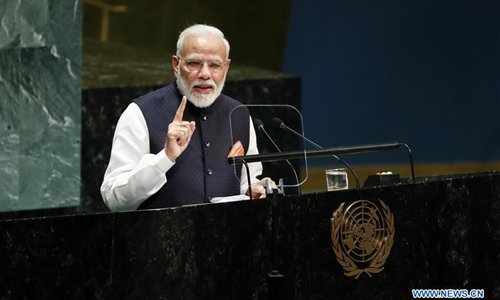HOME >> WORLD
Modi eyes Saudi crude after dropping imports from Iran to avoid sanctions
Source:Global Times Published: 2019/10/30 22:33:41

Indian Prime Minister Narendra Modi addresses the General Debate of the 74th session of the UN General Assembly at the UN headquarters in New York, on Sept. 27, 2019. (Xinhua/Li Muzi)
Saudi Arabia will invest in India's downstream oil industry and gas projects, as Indian Prime Minister Narendra Modi announced plans to seek a "closer strategic partnership" with Saudi Arabia instead of just a purely buyer-seller relationship, attempting to fulfill domestic oil demand after India dropped imports from Iran to avoid US sanctions.
"India imports around 18 percent of its crude oil from the kingdom, making it the second-largest source of crude oil for us," Modi said in an interview with Arab News on Tuesday during his official visit to the Middle Eastern kingdom. "We believe that stable oil prices are crucial for the growth of the global economy, particularly for developing countries."
An agreement at the Strategic Partnership Council, which is said to open cooperation across sectors, including trade, investment, security and defense, will also be signed with Saudi Arabia during his visit, Modi said.
Modi also hopes to undermine the "Islamic" card of Pakistan in the Middle East, Pinak Ranjan Chakravarty, a former secretary in India's Ministry of External Affairs, said in an article published on thequint.com.
The crisis in India-controlled Kashmir, triggered by India's decision to impose direct rules on the region, gave rise to a global pushback against India. However, since Pakistani Prime Minister Imran Khan has failed to convince Saudi Arabia to condemn India, it might suggest that overlapping interests are overriding Pakistan's Islamic appeal.
Prior to the new agreement, Saudi Arabia said it will supply as much as 5 million barrels of crude oil per day to Reliance Industries, India's multinational conglomerate, according to the Indian newspaper Business Standard. Saudi Arabian state petroleum and natural gas company Aramco will also invest in major downstream oil projects in India's west coast and in the country's strategic petroleum reserves under the new partnership, Modi said.
India is the third-biggest oil consumer in the world, and its demand for oil will also increase by the fastest pace globally this year to 4.88 million barrels per day, according to a monthly world oil demand report by the Organization of Petroleum Exporting Countries.
To fulfill its rising oil demand, India has been relying heavily on imports. Previously, Iran fulfilled around 10 percent of its needs. However, it dropped its dependency after the US waivers from sanctions expired in April.
Indian newspaper The Economic Times reported that Indian reliance on Iranian oil was down from around 2.5 billion to 1 million tons per month in April. By the end of May, the country had stopped buying oil from Iran to comply with the US sanctions, according to India's Ambassador to the US Harsh Vardhan Shringla.
Posted in: CROSS-BORDERS,WORLD FOCUS